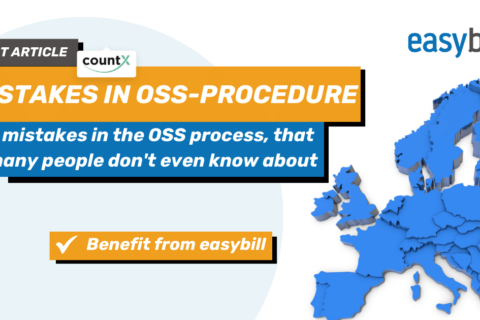
Tax regulations in Germany are subject to regular changes: The Growth Opportunities Act was a good example of this in 2024. The Annual Tax Act 2024 will now bring a number of adjustments for the new year that entrepreneurs should be aware of. The biggest change is certainly the introduction of mandatory e-invoicing, which we have already reported on here several times. This article will give you an overview of the most important changes that you should be aware of in 2025.
What is the Annual Tax Act?
The Annual Tax Act is a regular legislative process that includes adjustments and innovations in tax law. The aim of this legislative reform is to update tax regulations and adapt them to new economic developments. There are also several changes in 2025 that affect VAT in particular and are relevant for entrepreneurs.
The e-invoice is here
The gradual introduction of mandatory e-invoicing for all B2B transactions in Germany began on January 1, 2025. As a result, companies and the self-employed are obliged to be able to receive e-invoices from 2025.
Longer transitional periods apply to the creation and sending of e-invoices: from 2027, the obligation to issue e-invoices will apply to companies with an annual turnover of €800,000 or more, until all companies in Germany will finally have to issue electronic invoices from January 1, 2028.
All information on the legal requirements and deadlines as well as valuable tips on preparing for the new invoice format can be found in our YouTube video on e-invoicing.
Shortened retention periods
Previously, invoices had to be kept for 10 years in accordance with Section 14b (1) sentence 1 UStG (VAT Act). This retention period was shortened to 8 years in the Bureaucracy Relief Act.
Changes to the small business regulation
The small business regulation, which allows companies to remain exempt from VAT, will also be amended by the Annual Tax Act 2025. From the new tax year, the turnover limits for small businesses will be raised. This means for you:
The turnover limit up to which you do not have to charge VAT as a small business owner will be increased from EUR 50,000 to EUR 100,000 for the current year. In the previous year, turnover may now be a maximum of EUR 25,000 instead of the previous EUR 22,000.
What is new here, however, is that the value for the current year was previously a sales forecast that had to be prepared at the beginning of the year. This forecast has now become a fixed value of EUR 100,000. If this is exceeded, a change to standard taxation must be made immediately, even during the year.
If you were previously just under the old limit, you now have more leeway without immediately slipping into VAT liability. For existing small businesses, this offers an opportunity to expand their business activities without directly incurring an additional tax burden.
Another new feature for small businesses is the elimination of the previously required “zero declaration” as an annual VAT return. From now on, this is only required if there were tax-relevant sales, which could be the case for foreign transactions, for example.
Changes to the advance VAT return
One of the key changes in the Annual Tax Act 2024 concerns the reporting deadlines and procedures for advance VAT returns. From 2025, the requirements for electronic returns will be tightened and digital processes will be increasingly used. This means for entrepreneurs:
If the VAT liability in the previous year is less than EUR 2,000 (previously EUR 1,000), an exemption from the advance VAT return is possible, in which case a company only has to submit one annual return.
If the previous year’s liability is over EUR 2,000 but still under EUR 9,000 (previously over EUR 1,000 but under EUR 7,500), the advance return must be submitted quarterly.
Only if the VAT liability in the previous year was over EUR 9,000 (previously EUR 7,500) must the advance return be submitted monthly.
More time for tax returns with a tax consultant
If your 2024 tax return is submitted by a tax consultant, you will benefit from an extended deadline. You then only have to submit it by April 30, 2026. If you do the return yourself, you only have until July 31, 2025.
Income tax: basic tax-free allowance is increased
With retroactive effect from January 1, 2024, the basic allowance for income tax has been increased to EUR 11,784. This is the amount up to which income is not taxed.
A further increase applies for 2025. The basic tax-free allowance is now EUR 12,096.
Increase in the limit for mini-jobs
Whereas mini-jobbers were previously allowed to earn a maximum of EUR 538 per month, this figure will rise to EUR 556 in 2025.
The reason for this is the direct linking of mini-jobs to the minimum wage, which has also been increased: From EUR 12.41 per hour to EUR 12.82.
Input tax flat rate for farmers and foresters is reduced
If farmers apply the so-called average rate taxation, they benefit from a lower rate. Until December 6, 2024, this was 9%, from this date it was reduced to 8.4% and since January 1, 2025 it is only 7.8%.
Are you prepared for the changes?
The Annual Tax Act 2024 brings many important changes for entrepreneurs, especially in the area of VAT. From new reporting deadlines and adjusted turnover limits to changes in the taxation of international services and goods deliveries – there are many aspects that you should keep an eye on.
To be optimally prepared, we recommend that you:
- Review your accounting processes and ensure that you comply with the new deadlines and reporting requirements.
- Analyze your revenue to determine if the new small business regulation applies to you.
- Consult with your tax consultant to understand which regulations apply to you.
With proper preparation and support, you can successfully navigate the new challenges brought by the Annual Tax Act 2025.




